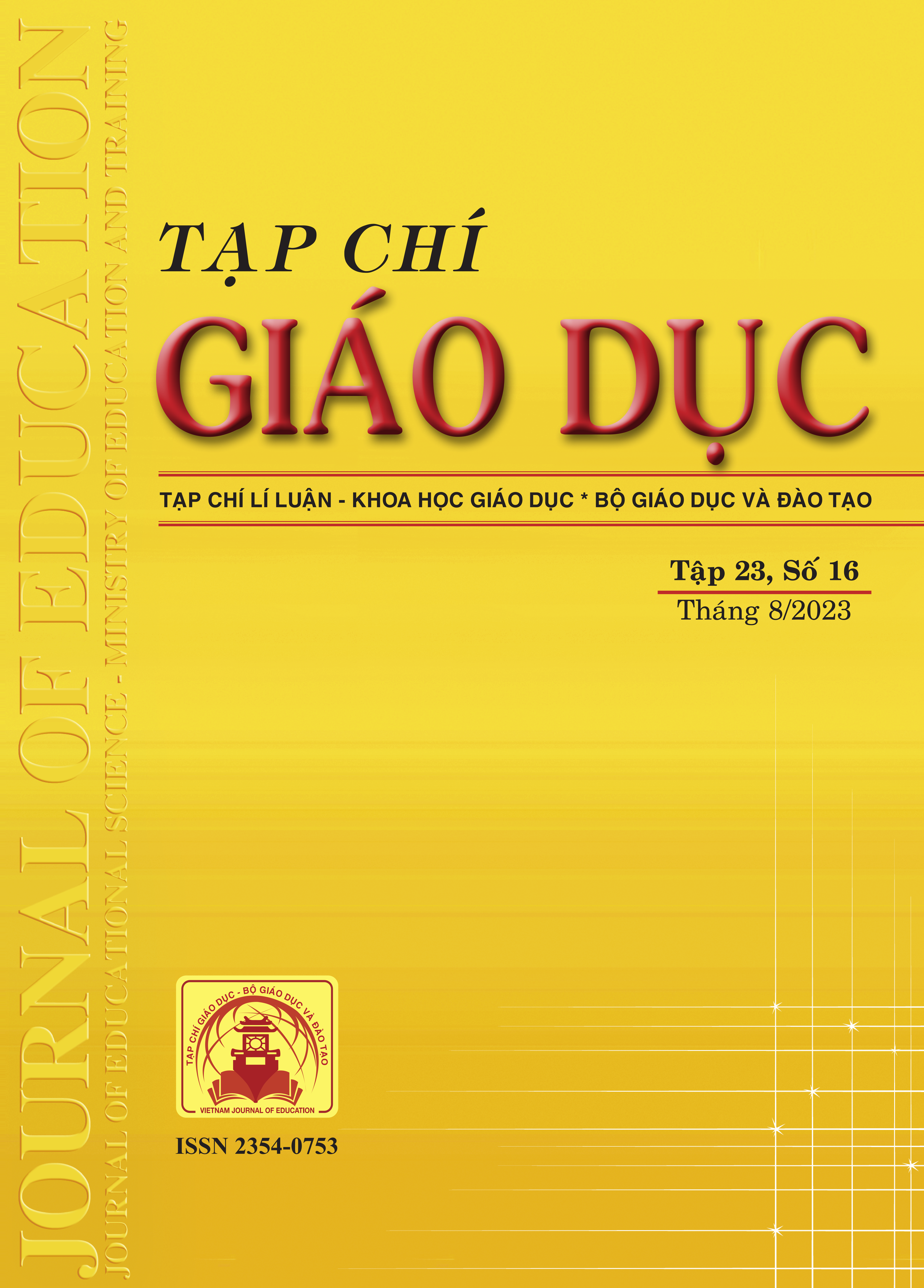Mô hình tăng trưởng và xu hướng nghiên cứu về giáo dục tài chính ở trường phổ thông từ 2001 đến 2022: phân tích thư mục với cơ sở dữ liệu Scopus
Tóm tắt
Financial education for teenagers, financial literacy, and financial attitudes of secondary school students have recently been prominent research trends. This study aims to explore the growth patterns and research trends in financial education in K-12 schools worldwide. A bibliometric analysis based on VOSviewer software was used to review 177 research publications published between 2001 and 2022 in the Scopus database. The research has found that there has been a sharp and relatively steady rise in financial education publications in K-12 schools since 2016, mainly from the US, Italy, Germany and the Netherlands. This research can be used by researchers, policymakers, administrators, and teachers as an input base for decision-making and practical experience in financial education implementation for students.
Tài liệu tham khảo
Amagir, A., Groot, W., Maassen van den Brink, H., & Wilschut, A. (2017). A review of financial-literacy education programs for children and adolescents. Citizenship, Social and Economics Education, 17(1), 56-80. https://doi.org/10.1177/2047173417719555
Amin, S., Rahman, L., Ainul, S., Rob, U., Zaman, B., & Akter, R. (2010). White paper: Enhancing adolescent financial capabilities through financial education in Bangladesh. https://doi.org/10.31899/pgy1.1022
Batty, M., Collins, J. M., & Odders‐White, E. (2015). Experimental evidence on the effects of financial education on elementary school students' knowledge, behavior, and attitudes. Journal of Consumer Affairs, 49(1), 69-96. https://doi.org/10.1111/joca.12058
Berry, J., Karlan, D., & Pradhan, M. (2015). The Impact of Financial Education for Youth in Ghana. https://doi.org/10.3386/w21068
Bruhn, M., Leão, L. D. S., Legovini, A., Marchetti, R., & Zia, B. (2016). The impact of high school financial education: Evidence from a large-scale evaluation in Brazil. American Economic Journal: Applied Economics, 8(4), 256-95. https://doi.org/10.1257/app.20150149
Hallinger, P., & Chatpinyakoop, C. (2019). A bibliometric review of research on higher education for sustainable development, 1998-2018. Sustainability, 11(8), 2401. https://doi.org/10.3390/su11082401
Hastings, J., Madrian, B., & Skimmyhorn, W. (2012). Financial Literacy, Financial Education and Economic Outcomes. https://doi.org/10.3386/w18412
Ingale, K. K., & Paluri, R. A. (2020). Financial literacy and financial behavior: A bibliometric analysis. Review of Behavioral Finance, 14(1), 130-154. https://doi.org/10.1108/rbf-06-2020-0141
Kakouris, A., & Georgiadis, P. (2016). Analyzing entrepreneurship education: A bibliometric survey pattern. Journal of Global Entrepreneurship Research, 6(1), 6. https://doi.org/10.1186/s40497-016-0046-y
Li, T., Bai, J., Yang, X., Liu, Q., & Chen, Y. (2018). Co-Occurrence Network of High-Frequency Words in the Bioinformatics Literature: Structural Characteristics and Evolution. Applied Sciences, 8(10), 1994. https://doi.org/10.3390/app8101994
Lusardi, A., & Mitchell, O. S. (2007). Financial Literacy and Retirement Preparedness: Evidence and Implications for Financial Education Programs. SSRN Electronic Journal. https://doi.org/10.2139/ssrn.957796
Moher, D. (2009). Preferred reporting items for systematic reviews and meta-analyses: the PRISMA statement (Chinese edition). Journal of Chinese Integrative Medicine, 7(9), 889-896. https://doi.org/10.3736/jcim20090918
OECD/INFE (2012). OECD/INFE High-Level Principles on National Strategies for Financial Education. OECD Publishing.
Organisation for Economic Co-operation and Development (2014). Students and money: Financial literacy skills for the 21st century (Vol. VI). Paris: OECD Publishing.
Organization for Economics Co-Operation and Development (2012). ODCE INFE Guidelines on Financial Education in Schools. https://www.oecd.org/daf/fin/financial-education/2012%20Schools%20Guidelines.pdf
Phạm Sỹ Nam (2020). Giáo dục tài chính thông qua dạy học hàm số trong nhà trường phổ thông. Tạp chí Giáo dục, 480, 21-24.
Pritchard, A. (1969). Statistical bibliography or bibliometrics? Journal of Documentation, 25(4), 348-349.
Shim, S., Xiao, J. J., Barber, B. L., & Lyons, A. C. (2009). Pathways to life success: A conceptual model of financial well-being for young adults. Journal of Applied Developmental Psychology, 30(6), 708-723. https://doi.org/10.1016/j.appdev.2009.02.0
Smith R. C., Sharp E. H., & Campbell, R. (2011) Evaluation of financial fitness for life program and future out-look in the Mississippi delta. Journal of Economics and Economic Education Research, 12(2), 25-39.
Totenhagen, C. J., Casper, D. M., Faber, K. M. (2015) Youth financial literacy: A review of key considerations and promising delivery methods. Journal of Family and Economic Issues, 36(2), 167-191. https://doi.org/10.1007/s10834-014-9397-0
Vitt, L. A., Anderson, C., Kent, J., Lyter, D. M., Siegenthaler, J. K., & Ward, J. (2000). Personal finance and the rush to competence: Financial literacy education in the U.S. Middleburg: The Fannie Mae Foundation.
Zupic, I., & Čater, T. (2015). Bibliometric Methods in Management and Organization. Organizational Research Methods, 18(3), 429-472. https://doi.org/10.1177/1094428114562629
Tải xuống
Đã Xuất bản
Cách trích dẫn
Số
Chuyên mục
Giấy phép

Tác phẩm này được cấp phép theo Ghi nhận tác giả của Creative Commons Giấy phép quốc tế 4.0 .












